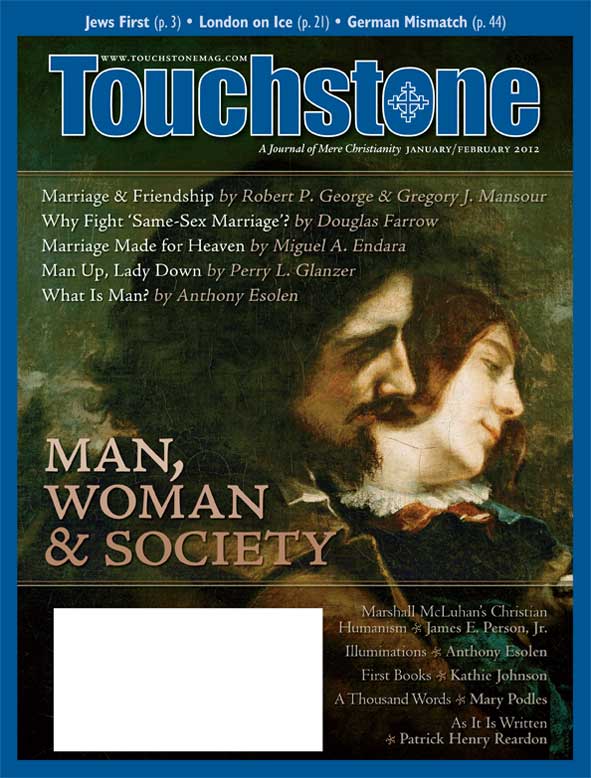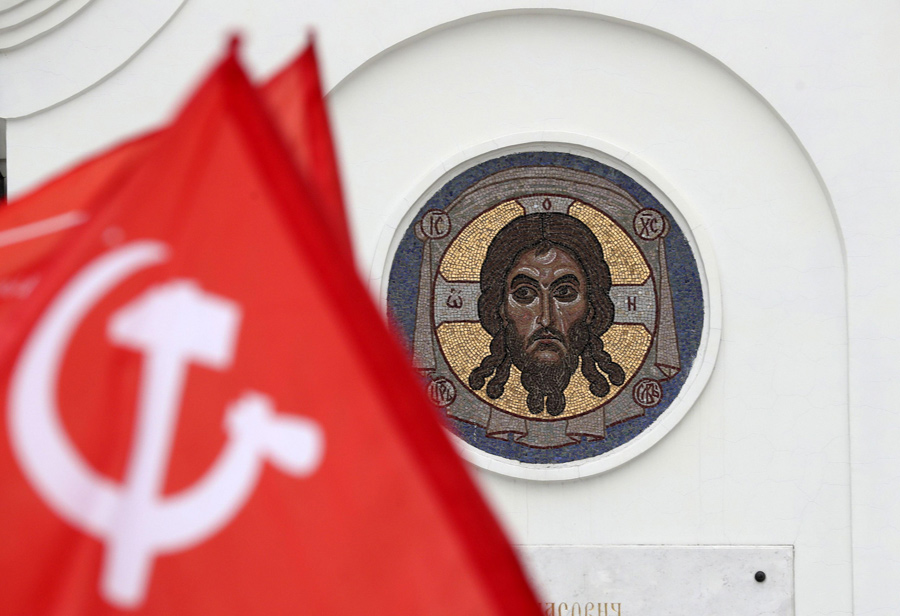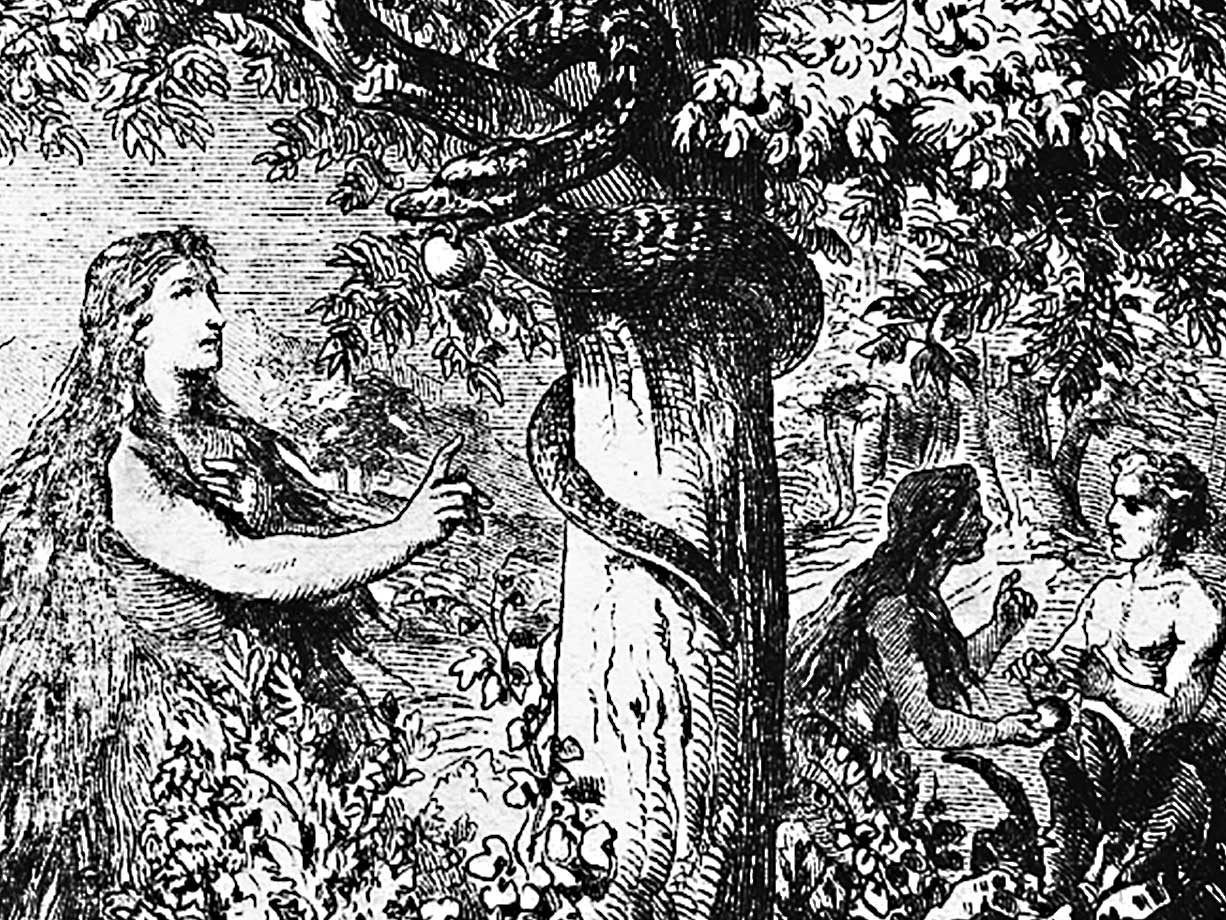Feature
The Medium Is the Mediator
The Christian Humanism of Marshall McLuhan
by James E. Person, Jr.
In a crowded journalism survey lecture I attended many years ago at the University of Michigan, Professor John Stevens concluded one day’s session by answering questions his undergraduate audience had jotted on note cards before class. He provided lengthy, knowledgeable answers and tart opinions to such questions as: “Is objective journalism possible?” and “Will ‘happy talk’ be a permanent fixture on television newscasts now and forever?”
And then came the final note card: “Explain Marshall McLuhan.”
The audience tittered. Stevens stared at the card and struggled to control a faint smile. To applause and laughter, he uttered a simple response: “Uh, no.”
From what the class had learned of McLuhan, no short answer was possible. Not then, and not now, more than a century after his birth (on July 21, 1911). Yet, though his name is not in the news as frequently as it was a generation ago, his words are still worth attending to, a fact that should be especially intriguing to the thinking Christian.

Prophet of the Global Village
For those who are familiar with McLuhan (1911–1980) only as a name, perhaps through Goldie Hawn’s giggly shout-out long ago on Rowan and Martin’s Laugh-In (“Whatcha doin’, Marshall McLuhan?”) or his awkward cameo appearance in Woody Allen’s film Annie Hall (1977), a few words of explanation may be in order. McLuhan, a longtime professor at the University of Toronto, is renowned as a pioneering media analyst and something of a secular prophet. Terms and phrases he coined—“the global village,” “the medium is the message” (or, alternatively, “the medium is the massage”), “cool media,” and “hot media”—have passed into common parlance.
He became famous during the 1960s and 1970s as a quirky genius who examined the transformative effect of media on the human mind and foretold the coming of a world in which everyone would be linked to everyone else across vast distances in real time. In 1965, novelist and New Journalist Tom Wolfe summarized this, McLuhan’s best-known theory (or “probe” as McLuhan called such assertions) in the following way:
The new technologies, such as television, have become a new environment. They radically alter the entire way people use their five senses, the way they react to things, and therefore, their entire lives and the entire society. . . . The most profound effect of television—its real “message,” in McLuhan’s terms—is the way it alters men’s sensory patterns. The medium is the message—that is the best-known McLuhanism. . . . The world is growing into a huge tribe, a . . . global village, in a seamless web of electronics.
McLuhan had seen this largely through the effects of television and related technological advances; and though he didn’t live to experience the rise of the Internet, he foresaw it.
As a writer and much-sought-after lecturer, McLuhan was often misunderstood by his audience—largely because of the elevated, allusive style of his prose and phrasing, which were characterized by “the expression of insights through aphorisms and a mosaic structure of presentation, expectations that readers will make their own discoveries . . . and above all, a refusal to present ideas with any concession to the expectations of readers,” according to his biographer, W. Terrence Gordon. But careful readers of the books for which McLuhan is best known—The Gutenberg Galaxy (1962), Understanding Media (1964), and The Medium Is the Massage (1967)—as well as Gordon’s invaluable biography, Marshall McLuhan: Escape into Understanding (1997), will readily see that he was a fascinating man with things to say that were occasionally puzzling, occasionally dead wrong, sometimes perception-altering, and always intriguing. And undergirding all his endeavors was a strong Christian sensibility, developed by his reading in the works of the Church’s foremost champions of thought.
Calm Poise, Fiery Conviction
Long before he rose to prominence, Herbert Marshall McLuhan, reared in Edmonton, Alberta, and Winnipeg, Manitoba, was recognized by his family, his teachers, and his peers as a young man in a hurry: he was a voracious reader of English and American literature, and driven to make his mark in the world of the intellect. In matters of faith, he was raised a Baptist, regularly attending church, Bible studies, and Sunday school throughout his youth.
During his early twenties, he struggled through an intense spiritual crisis that led him into a mild but bitter agnosticism, yet he always kept one foot in the world of faith. Near the outset of this conflict, he confided to his diary, “As long as the example of Jesus Christ stands before us, let everyone be ashamed of even a moment of self-complacency.” This was a brave belief to hold at a time when he was finding preachers dull and local church leaders dismayingly uninformed and unable to answer his questions.
Biographer Gordon notes that young McLuhan’s reflections on matters of faith led him to the conclusion that “the uniqueness and dynamism of the Christian faith sprang from Pentecost.” “After that experience,” McLuhan wrote, “all things past, present, and future are settled in the mind. Casuistry, ethics, doctrine, race and all are transcended.” He prayed that he might apprehend the fullness of the Christian experience, which he believed would reconcile seamlessly with his own ever-curious mind. “I am of a critical and inquiring nature,” McLuhan wrote shortly before his twentieth birthday,
but the true Christian experience, reception of the Holy Ghost is a fact that transcends analysis. Once filled with the miraculous spirit one may or may not give up one’s ideals and plans; but whichever happens, there is never a regret. There is absolutely nothing that can disturb the calm poise yet fiery conviction and the noble spirit of service that is the happy lot of the true Christian.
Sojourns in England
After attaining his bachelor’s and master’s degrees at the University of Manitoba, McLuhan pursued further studies at Cambridge University. In two separate stays—punctuated by an interlude in the United States, where he taught at two universities and got married—he earned another B.A., another M.A., and eventually his doctorate, concentrating in English literature. At Cambridge, his wide-ranging reading in both sacred and secular literature—including the works of St. Thomas Aquinas, John Henry Newman, Christopher Dawson, and Father Martin D’Arcy—served him well.
More importantly, he delved into the works of G. K. Chesterton, who was at the time still a living, influential public figure. McLuhan was especially struck by Chesterton’s What’s Wrong with the World (1910), a work warning its readers that society’s leaders had elevated the abstract, the ideological, and the artificial ideal above the human and the sacred, and thus created bedlam, not community; emptiness, not wholeness. Thanks largely to his reading of Chesterton, McLuhan converted to Roman Catholicism during his mid-twenties, and he took his faith seriously all his life long. “Had I not encountered Chesterton I would have remained agnostic for many years at least,” he wrote in a letter in 1935. Many years later, McLuhan said of Chesterton, “I know every word of him: he’s responsible for bringing me into the church.”
Both men were well aware of the reality of sin and its dire effects, as well as its role as a reminder of something better. “The fact that even in our disordered lives we have innumerable intimations of an order from which we have fallen is evidence of a mind and a being above the natural order we perceive,” McLuhan wrote to his brother, Maurice.
But the order in the universe (as well as its “purpose”) depends upon its being held in position, so to speak, by God’s will and intelligence. God is independent of the universe . . . but he is also immanent in it in the sense that its order and life depend upon him.
Biographer Gordon notes that Chesterton and St. Thomas Aquinas “were his two biggest influences. He loved Chesterton’s rhetorical flourishes, imbibed his playfulness, [and] turned his impulse to try out new combinations of ideas into the hallmark of the McLuhan method.” From Aquinas, McLuhan derived the belief that Catholicism entails what he termed “complete intellectual freedom to examine any and all phenomena with the absolute assurance of their intelligibility,” a fact that enabled him, late in life, to say that “belief in God alters existence . . . converting a leaden uninspired human into something lyrically superhuman.” McLuhan declared himself “a Thomist for whom the sensory order [the sensible world] resonates with the Divine Logos.”
Embracing Catholic Christianity was a life-fulfilling step for McLuhan, who attended Mass daily and arose at 4:00 or 5:00 every morning to read passages of Scripture in English, Italian, Spanish, and French, and to ponder their meaning.
Key Guides and Mentors
At Cambridge, he studied English literature under I. A. Richards, whose critical method entailed examining works of poetry illatively, in terms of imagery, allusion, metaphor, rhythm, irony, intention, form, and attitude. In his study of literature, as in his later studies of media, this approach became McLuhan’s method of choice. Significantly, during his years at Cambridge, he also began to be drawn to the work of Wyndham Lewis and the Cambridge scholar F. R. Leavis, who, as Tom Wolfe has noted, “were treating movies, radio, advertisements, and even comic strips as a new ‘language.’”
In his doctoral dissertation, eventually published as The Classical Trivium: The Place of Thomas Nashe in the Learning of His Time, McLuhan brought the methods of Richards, Lewis, and Leavis to bear upon the roles of grammar (the art of interpreting phenomena), dialectics (the mechanics of argumentative analysis), and rhetoric (the use of language to instruct and persuade) in classical learning. He surveyed their respective purposes and internal dynamics in the works of Western literature from Cicero through Nashe, an Elizabethan-era prose writer.
In his dissertation, McLuhan wrote knowledgably of the natural-law tradition, which has been succinctly defined by the notable man of letters Russell Kirk as “a loosely-knit body of rules of action prescribed by an authority superior to the state.” Whether derived from divine commandment, from right reason—with which man is endowed by his Creator—from the nature of mankind empirically regarded, or from the long experience of humankind in community, natural law, Kirk explained, “is bound up with the dignity of man, and with the experience of humankind ever since the beginning of social community.”
Given that he was an ardent reader of Aquinas, Newman, Dawson, and Chesterton, it is not surprising that McLuhan affirmed the natural-law tradition. Newman may also have influenced McLuhan’s faith and method of analysis through his idea of the illative sense as a guide to authority in determining the values, norms, principles, dogmas, and doctrines that combine to make for truth. McLuhan once wrote, “You don’t come into the Church through ideas and concepts,” or through precepts, but through percepts, the realm in which truths are ascertained through parable, analogy, and the moral imagination. To him, the idea of speaking of God as a concept or an idea was ludicrous, for God is Truth.
To Educate a Large Public
Perhaps to the surprise of those who know about this aspect of McLuhan’s life, there is no overt trace of this fervent faith in the writings for which he is best known. As he set about crafting what became his first book, an analysis of the subliminal within modern advertising titled The Mechanical Bride (1951), he wrote to a friend, “There is no need to mention Christianity. It is enough that it be known that the operator is a Christian.” The resulting work, he insisted, “can serve to educate a huge public, both Catholic and non-Catholic, to resist that swift obliteration of the person which is going on.”
McLuhan was no “hot-gospeler” at any time during his life, though he lent quiet support to certain causes consistent with his faith and his belief in the dignity of man. As journalist and speechwriter Joseph P. Duggan has observed,
McLuhan was neither an ideologue nor a partisan, nor did he have a political project. He supported the pro-life cause against abortion, but he was not an “activist.” He was repelled by “activism,” which he described as “obsession with efficient causality”—a “Protestant sort of fixation.” Reverence for Being and the quest for understanding and making natural law a way of life in the tradition of Cicero and Aquinas were the alpha and omega of McLuhan’s politics.
The Age of Sentiments
Contrary to common perception, McLuhan did not perceive the coming triumph of the global village as a panacea for the world’s ills. Despite a one-time remark about the “seamless web” of electronic media bringing about the Brotherhood of Man, he wrote elsewhere, “I don’t approve of the global village. I say we live in it.” He knew that the act of simply shoving people together higgledy-piggledy, with no common culture, does not a community make. In an interview, he once said, “When people get close together, they get more and more savage, impatient with each other.” Asked if this was because of the very nature of man, McLuhan explained, “His tolerance is tested in those narrow circumstances very much. Village people aren’t that much in love with each other. The global village is a place of very arduous interfaces and very abrasive situations.”
Television would not smooth these “arduous interfaces”—in fact, just the opposite. At the height of his fame, McLuhan wrote a letter to one of his grown sons, regarding his granddaughter: “Try not to have Emily exposed to hours and hours of TV. It is a vile drug which permeates the nervous system, especially in the young.”
Television and other electronic media ushered the world’s people with a rush into what Russell Kirk called “the Age of Sentiments,” a time of unreflective intuitions—in which “the immense majority of human beings will feel with the projected images they behold upon the television screen; and in those viewers that screen will rouse sentiments rather than reflections.” It is an environment in which “the rising generation say unto us, ‘We feel that human rights are being violated in Cloud-cuckooland’—not knowing, not thinking, but feeling. Policy becomes the art of applying intuitions.”
Both Kirk and McLuhan—who did not know each other here below—foresaw the effects of a “seamless web of electronics”: a generation of wired-in young people who are totally connected but in many cases cannot think critically, read anything at length, or form face-to-face (as opposed to online) relationships. Both men were pioneers in discerning the potentially harmful role of modern media, though McLuhan achieved far more renown than Kirk in this regard. Where Kirk viewed the coming of electronic media in philosophic, historic, and moral terms, McLuhan scrutinized it in detached, clinical terms through the lenses of logical and psychological assessment, observing and noting effects alone rather than affixing judgments upon those effects. He once wrote, “My own writing has been entirely in the world of formal causality, the study of effects, rather than the assertion of values.”
A Call to Awaken
And yet McLuhan, as a follower of Christ, could not escape the call upon his conscience to acknowledge and oppose the denigration of values and norms within the global village. He was dismayed that Christians were content to march steadily through the declining twentieth century and into the twenty-first largely ignorant of and indifferent to the rationale of electronic technology: the way in which we shape and manipulate media and are ourselves shaped and manipulated by them.
He also saw the potential for electronic media to bring about the aforementioned “obliteration of the person,” once writing that “man has become essentially discarnate in the electric age. Much of his own sense of unreality may stem from this. Certainly it robs people of any sense of goals or direction.” And in a letter to Clare Boothe Luce, he wrote, “Discarnate man is not compatible with an incarnate Church.”
A loss of goals or direction, a loss of purpose and meaning in the world: Is this not the road to the abolition of man, the rendering of human beings into mere trousered apes? In this matter, what McLuhan once wrote of Chesterton applies equally to himself: he spent his life “examining current fashion and fatalism” out of concern “lest certain infinitely valuable things, such as the family and personal liberty, should perish.”
By McLuhan’s lights, for men and women to be users of media while remaining ignorant of the implications of their use of it placed humanity in the position of “monkeys monkeying with a loaded shell,” in Henry Adams’s phrase. During the early 1960s, when he was researching and writing Understanding Media, McLuhan confided to a friend his “terror” at the prospect facing civilization if men did not learn to understand the use and consequences of new media. He could not understand why his audience sometimes seemed more irritated than alerted by his warnings on such matters, writing, “It is almost like the anger of a householder whose dinner is interrupted by a neighbor telling him his house is on fire. This irritation about dealing with the effects of anything whatever, seems to be a specialty of Western man.”
In 1974, while being driven home after a seminar, McLuhan mused aloud to his son Eric,
Is it worth it? All this effort to alert people, when they just attack the bearer of news and do nothing. Do I have the right to, am I supposed to, should I continue to keep investigating and making discoveries? Why bother, if the West is being discarded and no one will do anything about it or even listen?
McLuhan knew what was wrong with the world, and he asked these questions in observation, not in anguish. When he died at his home in Toronto on the final day of 1980, after struggling for months with the effects of a stroke, he died at peace with God and man.
The Mediator & the Message
“You might look at Marshall McLuhan as a sort of electric grinding wheel, sending off sparks in every direction,” said John Stevens to his lecture class many years ago. “Some of those sparks catch fire and shine light on one thing or another, and other sparks just vanish.”
To be sure, some of McLuhan’s utterances were off the mark, but he knew the Source of illumination. “In Christ, Medium becomes message. Christ came to demonstrate God’s love for man and to call all men to him through himself as Mediator, as Medium,” he said once. “And in so doing he became the proclamation of his Church, the message of God to man. God’s medium became God’s message.” A lifelong devotee of Joycean puns and creative wordplay, McLuhan might well affirm that the Mediator is the Message: an apt postmodern descriptor for the Door to the sheepfold, the Way, the Truth, and the Life.
Aside from the willingness to be a faithful servant and instrument of God, the act of becoming educated about the effects of modern media, as McLuhan strongly urged, is a good step toward avoiding corruption in the modern world. Further, it is essential to determine how we, as users and producers—artists, writers, actors, directors, costumers, light and sound technicians, cinematographers—can take up the tools of modern media in a manner that affirms the dignity of man. Russell Kirk wrote, “In any age, unless we are to be utterly vanquished, we must take up the tools—the weapons, if you will—effective in that age.” For there are high sentiments that can be roused in the Age of Sentiments, as well as low ones: high sentiments such as honor, courage, magnanimity, and character.
If there must be a global village, let there be in it a redemptive element, a remnant of civility and of upholders of the permanent things, whose presence redeems the realm of discourse, news, drama, and entertainment in all their forms. The transformative power of Pentecost remains, though in some cases godly change is effected through conserving what might otherwise be lost.
Commentators have noted the rich irony in the fact that McLuhan, during his day in the sun, was considered “one of us” by shaggy campus leftists and would-be intellectuals of every stripe, who failed to see the eternal rebel in the heart of this cultural conservator. For throughout his career, in words that were often outside the intellectual shipping lanes of his audience, McLuhan sought to instruct and warn in defense of the permanent things. “If he gets his just deserts,” concluded Joseph Duggan, “his work, like that of his heroes Chesterton and St. Thomas, will be taken seriously for a very long time to come.” •
James E. Person, Jr. is the author of Russell Kirk: A Critical Biography of a Conservative Mind (Madison Books), as well as Earl Hamner: From Walton's Mountain to Tomorrow (Cumberland House Publishing), and is a longtime book reviewer. He has written on Kirk and on Evelyn Waugh for Touchstone.
subscription options
Order
Print/Online Subscription

Get six issues (one year) of Touchstone PLUS full online access including pdf downloads for only $39.95. That's only $3.34 per month!
Order
Online Only
Subscription

Get a one-year full-access subscription to the Touchstone online archives for only $19.95. That's only $1.66 per month!
bulk subscriptions
Order Touchstone subscriptions in bulk and save $10 per sub! Each subscription includes 6 issues of Touchstone plus full online access to touchstonemag.com—including archives, videos, and pdf downloads of recent issues for only $29.95 each! Great for churches or study groups.
Transactions will be processed on a secure server.
more on christianity from the online archives
more from the online archives
calling all readers
Please Donate
"There are magazines worth reading but few worth saving . . . Touchstone is just such a magazine."
—Alice von Hildebrand
"Here we do not concede one square millimeter of territory to falsehood, folly, contemporary sentimentality, or fashion. We speak the truth, and let God be our judge. . . . Touchstone is the one committedly Christian conservative journal."
—Anthony Esolen, Touchstone senior editor













